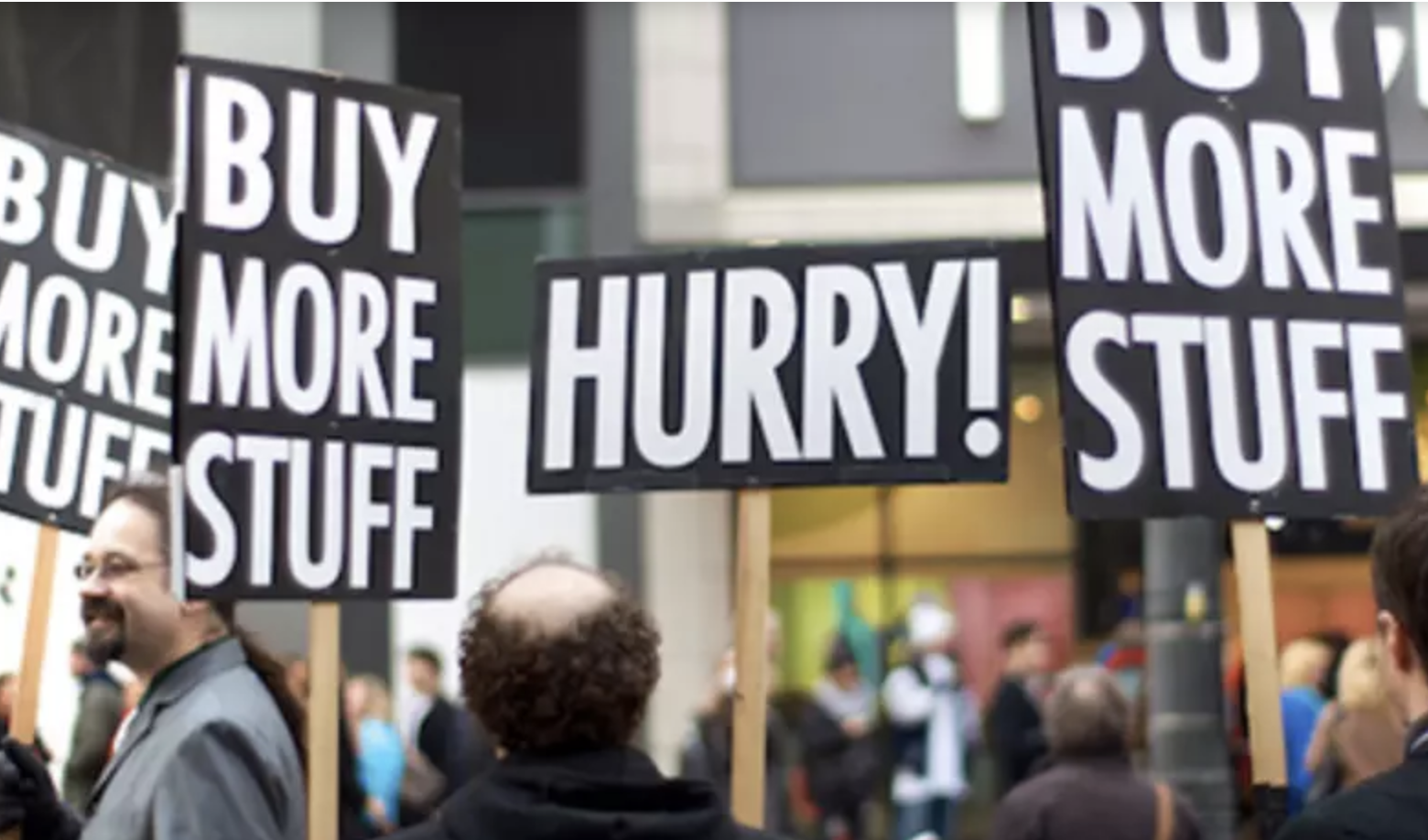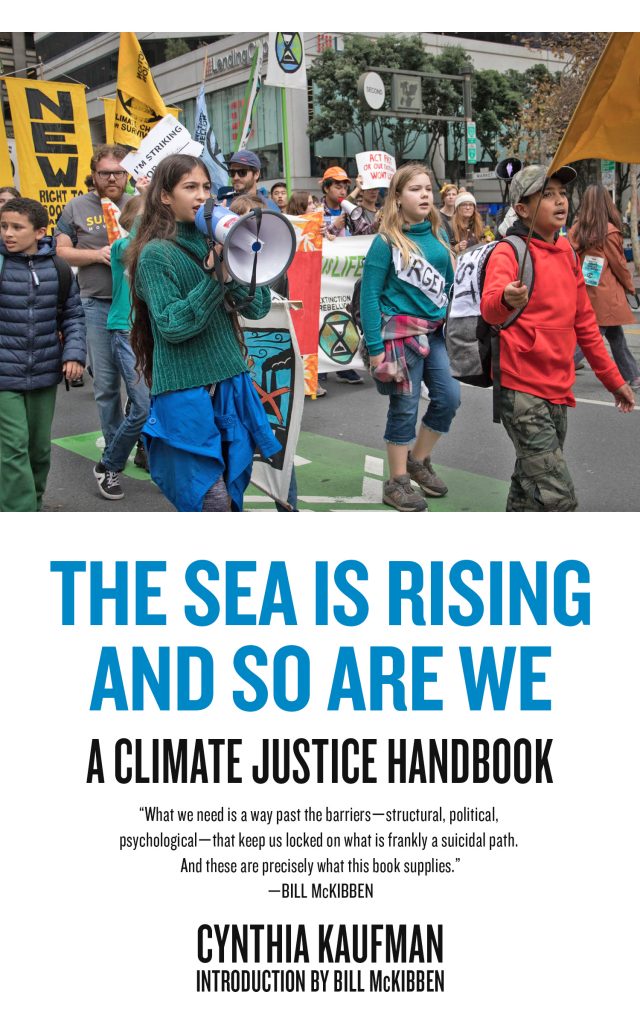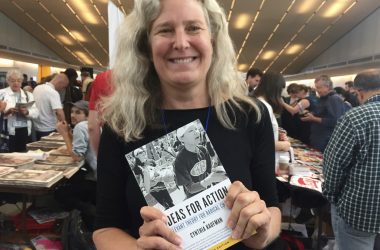By Cynthia Kaufman
Common Dreams
August 12, 2021
Making a shift toward a society that works for people and the rest of nature involves freeing people from the pulls that tie them to a need for more.
Is it possible to build a society where people have enough to live well and also feel that they have enough? Or are we doomed as a species to stay on the hedonic treadmill that keeps us wanting more consumer goods, even as we destroy the natural world to get those things? Are we doomed to make ourselves miserable trying to make ourselves happy?
In his book Happiness: Lessons from a new Science, Richard Layard argues that beyond a very low level of having one’s basic needs met, which globally is $10,000 per year, a society with more wealth has no more happiness than a society with less. The things that have the most impact on happiness are health, security that one will have nutritional food, housing, and the things needed to participate in the life of the society one lives in, and security that there will be some system of care for when one is old.
Fighting for policies that raise wages, tax the rich, challenge racial disparities, and lead to higher levels of equality need to be central parts of our work to build a just and sustainable society.
The happiness literature is unanimous on the claim that societies with high levels of inequality have less happiness than ones with more. The US, a highly wealthy and highly stratified society, has the same average level of happiness as Costa Rica, a country with much lower levels of inequality and much less per capital wealth. Costa Rica also has much lower levels of per capita greenhouse gas emissions. In a society with high levels of inequality those at the top are generally, on average, happier than those lower down. Other research has shown that status anxiety, or a worry about one’s place in society, is higher in a highly unequal society, even for those at the top, than it is for people at the bottom in relatively egalitarian societies. Since a significant driver of the human desire for more comes as a result of life in a society with high levels of inequality, a crucial part of our work to build a world where we can all live well must be focused on building a socially just society with high levels of equality.
In a society with a high level of inequality, having more does, on average, make a person happier than a person who has less. But that isn’t that more stuff makes you happier. Rather, in a stratified society, having more stuff than other people makes you happier than them. People are not innately driven to seek after more things. They are driven to feel good about themselves, and in an unequal society, where status comes from having more than the next person, we are on a treadmill of destruction to use our resources in ways that feed people’s status anxiety while enriching those who profit from it. High levels of inequality drive the engine of status seeking and status seeking is one of the drivers of environmentally destructive consumerism.
A crucial step to building a sustainable society, then, is challenging inequality. In The Spirit Level: Why Great Equality Makes Societies Stronger, Kate Pickett and Richard Wilkinson make a very compelling case, backed by strong empirical evidence, that inequality is a primary driver of many forms of social dysfunction. They argue that on many measures of social wellbeing, societies with higher levels of inequality have worse social outcomes. Their examples include mental health, incarceration rates, mortality, educational attainment, teen pregnancy, lower levels of social mobility, and more.
They find that the negative impacts are not just for the poor, or for the society on average, but that the well off in unequal countries also do worse on these measures. They also argue that the negative impacts of inequality are one of the most important drivers of a wide variety of bad social outcomes. They argue that there is a tendency for some countries to do well on just about everything and others to do badly. You can predict a countries’ performance on one outcome from a knowledge of others. If—for instance—a country does badly on health, you can predict with some confidence that it will also imprison a larger proportion of its population, have more teenage pregnancies, lower literacy scores, more obesity, worse mental health, and so on. Inequality seems to make countries socially dysfunctional across a wide range of outcomes.
In contemporary societies with high levels of inequality, people have become highly self-conscious, obsessed with how we appear to others, worried that we might come across as unattractive, boring, stupid, or whatever, and constantly trying to manage the impressions we make. And at the core of our interactions with strangers is our concern at the social judgements and evaluations they my make: how do they rate us, did we give a good account of ourselves? This vulnerability is part of the modern psychological condition that feeds directly into consumerism.
Greater inequality seems to heighten people’s social evaluation anxieties by increasing importance of social status. Instead of accepting each other as equals on the basis of our common humanity as we might in more equal settings, getting the measure of each other becomes more important as status differences widen. We come to see social position as a more important feature of a person’s identity.
They also argue that once a society has a high level of inequality, levels of trust deteriorate, and that leads to more mistrust, which then leads to support for policies that lead to more inequality, because “mistrust and inequality reinforce each other.”
In Luxury Fever: Why Money Fails to Satisfy, Robert H. Frank argues that in highly unequal consumerist societies, we are driven to conspicuous consumption because it benefits the individual, even though it is bad for society. It is he claims “smart for one and dumb for all.” One nice example he gives is of a town along a strip of highway with no regulations on signs. Every business will compete to have larger and more garish signs to attract more customers. But if the town had a law that limited the size of signs, then everyone, would be better off. The town looks better and the store owners are not compelled to waste money on huge signs. In a stratified society, an individual is made happier by having more than others. But having more inequality in a society leads to less overall happiness.
In the US, the size of houses doubled between the years 1970 and 2010, but the level of happiness has stayed the same. There is a dramatic and devastating shortage of housing available for people with low and moderate incomes. There was a time when as a society we invested in building housing for people who did not have a lot of wealth or income. There were single room occupancy hotels, government subsidized apartment complexes, and many developers building small homes. In the past 50 years, we have shifted from a politics that argued government needed to solve problems to a neoliberal and racist view that argues that people who aren’t doing well only have themselves to blame. And so, those modest forms of housing aren’t being built anymore. We are speeding tremendous social resources building McMansions while millions are precariously housed or unhoused.
As long as people think they need a big house and a fancy car to feel that they are socially successful, they will continue to vote for politicians who promise to give them those things, and they will keep being pulled into wanting more. We need to change the social context that feeds that avarice. The single greatest policy shift that will slow the hedonic treadmill is to enact policies, such as taxing the rich, that will reduce inequality.
What seemed impossible only a few years ago, now is on the national agenda. Many politicians and social movements are working to regulate monopolies, eliminate tax havens, and reform the tax code to tax the rich and corporations. None of the policies needed to challenge inequality are easy to achieve, and yet none are pipe dreams either. Efforts to reduce inequality have been tried and won, and lost again, and won again over time. One of the first acts of the incoming Biden presidency was to give an earned income tax credit to low-income families. This move singlehandedly put millions of people on a pathway out of poverty. The kinds of movements which have led to nationwide transformations in inequality have generally come as the result of years of organizing. Work being done by the labor movement to raise the minimum wage and unionize Amazon warehouses, should be seen as part of the struggle for a sustainable society.
The climate crisis requires urgent action to reduce greenhouse gas emissions in half by 2030. That will be very difficult to achieve, and it is made more difficult in a society that is so unequal that people don’t trust one another, and where they feel driven to ever higher levels of consumerism to feel socially successful. Having important social decisions be driven by insatiability and profit is leading to environmental devastation, poverty, and low levels of happiness. Making a shift toward a society that works for people and the rest of nature involves freeing people from the pulls that tie them to a need for more. Fighting for policies that raise wages, tax the rich, challenge racial disparities, and lead to higher levels of equality need to be central parts of our work to build a just and sustainable society. Environmental sustainability and social sustainability are deeply interrelated parts of the same struggle.




